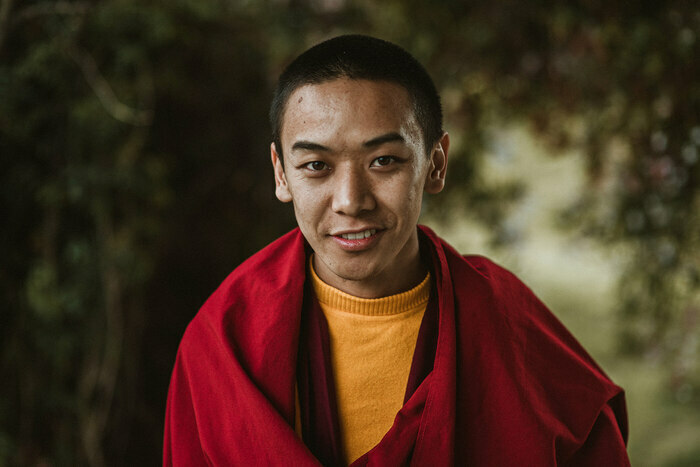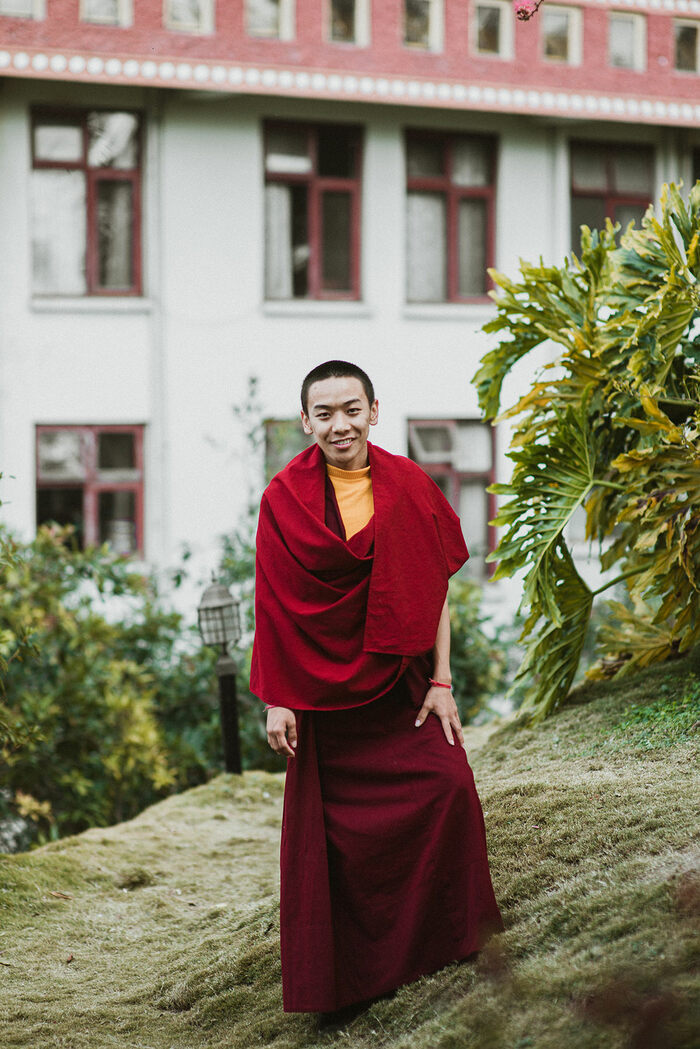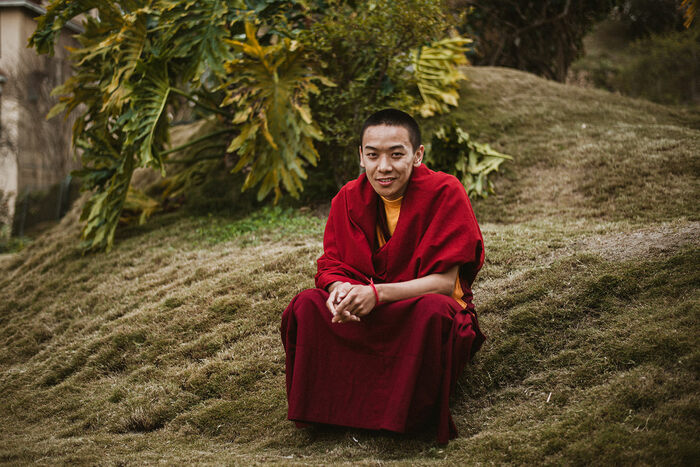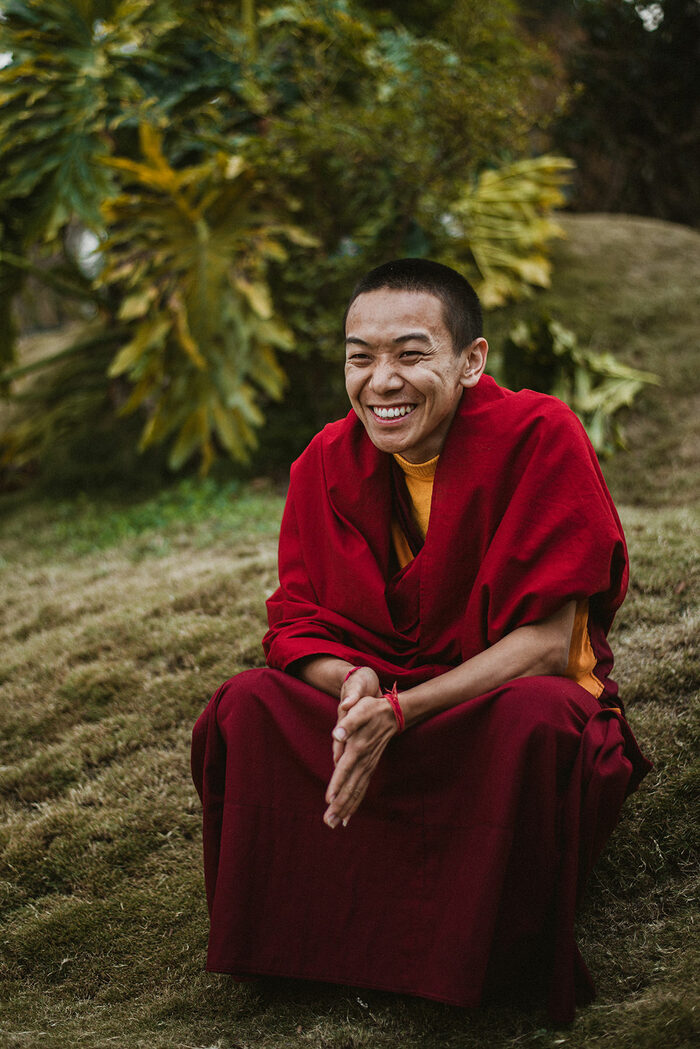
It was a fantastic experience to sit down with the young Charok Lama, a rising star in the Tibetan Buddhist world, for an interview in the peaceful gardens of Kopan Monastery in Kathmandu. Officially known as Ngawang Rigdzin Gyatso Rinpoche, he was born in 1995 in the Solu Khumbu region of Nepal and, at the age of two, was recognized as the reincarnation of Kusho Mangden, one of the most highly revered Nyingma yogis from the area. At the age of eight, Charok Lama moved to Sera Je Monastery in southern India to pursue a geshe degree. Despite his youth, he has already become known for his wisdom, compassion, and dedication to the teachings of the Buddha.
During our conversation, Charok Lama spoke candidly about his observations on the state of the world today, expressing concern for the sense of lostness and confusion that many people seem to be experiencing. He shared his thoughts on what can be done about this, emphasizing the importance of cultivating mindfulness, compassion, and a sense of purpose in our lives. He also spoke about the need for Buddhists to be always mindful of the ways in which our egos can interfere with our practice, and to constantly work to reduce our attachment to the self.
One of the most profound moments of our conversation came when Charok Lama spoke about the importance of contemplating death. He shared how this practice has been life-changing for him, helping him to recognize the impermanence of all things and to focus his attention on what truly matters in life. His words were a powerful reminder of the transformative potential of Buddhist practice and of the profound wisdom that can be found in the teachings of the Buddha.
Throughout the interview, Charok Lama’s humility, insight, and compassion shone through, and it was clear that his words were not just the product of book learning, but of deep personal experience and reflection. It was an honor to sit with this remarkable young teacher and to hear his insights, and we hope that our conversation will inspire others to engage with the teachings of Buddhism in ways that promote greater peace, compassion, and happiness. Enjoy!
Study Buddhism: You are, by far, the youngest interviewee we have had at Study Buddhism. But I attended the talk you gave last night to the attendees of the November Course here at Kopan Monastery, and I was impressed that you seemed to be so wise beyond your years. You were able to distill most people’s questions and problems – some of whom were many decades older than you – into simple terms with very clear and concise answers. What do you see as the biggest problem facing people today?
Charok Lama: If you look at the world today, the main problem is that people are lost. They’re very disconnected with themselves on many different levels. What the world promotes to you are all based on challenges, needs, temptations and so on. I think Buddhism appeals to a lot of people because it gives an understanding of who you are, what you are, what your path is.
Buddhism has changed my life a lot. In your teenage years you are all over the place and not sure about life. I’ve also been through something like that. After I entered the Buddhist monastic university studies and I learned about the six paramitas, it really changed me personally and helped me.

When you talk about samsara and you talk about your problems within samsara, you realize that most of the problems are related to the mind. Buddhism is a method to tweak your mind, to work on your mind. It doesn’t matter how stressful a situation might be: how you deal with the stress depends on your mind. You might be living in a hot desert or a frozen land, but it is based on the workings of your own mind that reactions and experiences arise. With Buddhism, we are working on our mind to a level where we can actually sustain any situation, and we are able to confront any problem without having mental afflictions.
You were recognized as a “tulku” at the tender age of two. This tulku system is a unique aspect of Tibetan Buddhism which evolved due to various social and political reasons, which many people in the Western world might not understand. What is your own view of this system?
You can recognize a tulku but remember that he’s still a kid. There’s no need to put pressure on him. Just let him grow up. Don’t pamper him, don’t over-expect anything from him. Let him be and, once he grows up, their real wisdom and abilities will start to appear. After that, you can say, “Oh, you are my guru.” Sometimes people say, “In his past life he was my guru, therefore he’s my guru in this life too.” But I think that sometimes recognized tulkus are not the exact reincarnations.
There’s also a problem when people expect too much from a reincarnate child and this child does not turn out how he is expected to be. Doubts emerge, criticisms come, and more problems abound. My advice to a lot of people who are wondering about this is, for the time being, let it be. And when he grows up, if he turns out to be the real guru you wanted, perfect!
In fact, the whole idea of rebirth is difficult for many Western students of Buddhism to accept or understand. Even the various Buddhist traditions throughout history have disagreed on what it is that gets reborn. How do you explain rebirth?
The easiest way to explain the idea of reincarnation or rebirth is through an understanding of the continuum of the mind. If you are someone who believes in past and future lives, in the continuum of the mind, then we are all reincarnations. Everyone is reincarnated. If you learn about the mind and the body, you can view the mind as the object inside the vessel, the body being the vessel. You’re actually changing the vessel, like pouring water from one cup into another, it’s something like that.
So, the water continues but the cups change. At the most basic level, the idea of reincarnation can be described as something like this. To understand reincarnation at the advanced level, first you need to understand the mind. Unless you understand what the mind is, reincarnation won’t make sense. The body is there. When it grows, gets old, after you die you either burn it or bury it, then it turns into dust. And that’s what the body is. But the mind is not like that.

To prove something like reincarnation is very hard. There are people who remember their past lives at a very young age, I’m not sure that I have personally met someone like that, but I’ve heard a lot of those stories. If you can understand the continuum of the mind, then reincarnation will become logical.
Many people nowadays suffer from chronic stress, which can be overwhelming physically and mentally. What advice would you give to those of us unable to cope when things feel out of control?
Nowadays, one of the biggest problems is not being able to keep the mind calm. The effects of the things that you do to keep your mind calm are momentary. As mentioned in the Buddha’s teachings, we call it momentary happiness. Instead of trying to keep your mind calm through working on yourself, on your mind, people instead try to keep their minds calm by going to a movie, going for a massage, those kinds of things. We need to understand that those things don’t last.
So, the most important thing is working on your mind. When you work on calming the mind, everything else starts to work out by itself. Even problems start to get solved by themselves. I know it sounds impossible, but it does happen, from my personal experience. Problems are not problems unless you make them a problem!
What is your advice to new students of Buddhism? How should they approach the teachings?
I really like that Buddhism can be approached in many ways: all the 84,000 teachings are different methods. Those different methods are directed at particular people with particular mindsets. There’s not one set of people with one set of logic and one set of approaches.
Because there’s so many teachings and so many subjects, I always tell people who are interested in Buddhism to focus on something that really touches their heart. For some, emptiness makes sense. For some, compassion makes sense. For some, impermanence makes sense. For someone who has suffered their whole life, connecting with the idea of the four noble truths makes sense. Whatever makes sense to you, you follow that. And because you follow that with some kind of feeling inside that really makes sense to you, then you start to see results.
Westerners should approach Buddhism by studying it. Not just studying it and lightly touching the topics, which these days a lot of people do. They touch this topic, “Oh, not so good.” They touch that topic, “Oh, not so good.” It shouldn’t be like that. If you really want to change yourself, you need to give it some time. Choose something that really makes sense to you, that really touches you. Then, once you start entering the path of studying and practising that certain topic, development naturally comes.
Certainly, Buddhist philosophy requires a lot of studying. I always regard with amazement those studying for a geshe degree, which can take 20 years of intense, non-stop study. Not everyone will be able to follow that path, so is there some kind of “easy Buddhism” that we can follow?
I still remember being in Bangalore, around the age of 13, when His Holiness the Dalai Lama was giving a public talk there. Someone had asked His Holiness this question at the end of the talk: “What’s the easiest way in Buddhism?” And His Holiness laughed and said, “One of the things about the world nowadays is that we’re all looking for easier, faster, better, cheaper.”

And that’s when I thought, “Oh yeah, it’s true. Even when it comes to religion, even Buddhism, we are looking for an easy way out. Should I do this, or should I do that? I need to make these kinds of life decisions, what do I do? I go to a lama and ask him to do a ‘mo’ (divination)!” His Holiness laughed and said, “In Buddhism, there’s no easy way out. You need to work on yourself. If you’re motivated, then the path becomes easy. If you’re not motivated, then the path becomes longer, harder! It’s in your hands!”
Of course, we can always rely on His Holiness to lay things out as they are! Do you think there are any particular elements of the Buddhist path that practitioners have the habit of overlooking?
A lot of people, instead of working on their ego, as in reducing their ego, are actually increasing their ego even more through the activities of their daily lives. If we want to proceed in life to become a practitioner and work on ourselves, then we need to work on reducing our ego. For entering the path, going on the bodhisattva’s way, eliminating the self-grasping attitude from the roots, you need real practice. It’s not easy. But on a basic level, reducing your ego, you can do. It’s not hard.
Apart from working on reducing the ego, how do we change ourselves to get rid of destructive emotions?
Change within yourself is dependent upon your effort, on how much you want to change, and it depends on your passion also. The first thing is you need that feeling of aspiration inside you. A lot of people think that the mind’s work depends on the body, meaning if the body is healthy, then the mind can work. If the body is not healthy, then the mind cannot work. It’s not like that. The mind and body work together, but they work completely differently. The mind is very hard to explain!
In the texts, we have the definition of the mind as “clear and knowing.” But in order to really understand the mind, you need to understand yourself. And for that, you need to work on yourself. Coming back to the idea of the mind and working on it, it all comes down to the emotions, I think. If you really want to understand your mind, the first thing you need to know is that your emotions are different from your body. There are also neuroscientific explanations on how chemicals work and trigger emotions.
Emotions are triggered from the senses that you have, not through chemical senses but the feelings that you have such as sadness, happiness, joy, those deep feelings. You see someone suffering – a dog, animal, whatever –and when you see them suffering there are these feelings within you. I call it the spark of compassion. It’s not full compassion, but it’s a small part of it, where you have that feeling, “Oh I want to have the ability to liberate them from that suffering.”
When you have these feelings, they are not chemically triggered. Those emotions are not connected with how your body is feeling. It doesn’t matter if you’re old, young, sad, happy, whatever. If you see something like that and you have that feeling, then there’s that link between your mind and the emotions.
Meditating upon the reality of death is one of the oldest practices in most Buddhist traditions and was taught by the Buddha himself. What are the benefits of this practice?
We ignore a lot of facts in life, and one of the biggest facts that we ignore about life is death. Not just Buddhists, but everyone fears death. As long as you’re alive, the biggest fear is death. You’re willing to give up your wealth to be safe; you’re willing to sacrifice two of your legs if you had to, just to be alive. If you understand what death is, then the small problems you have won’t matter. However, generally in the world, we concentrate on small things, and we are very good at making those small problems into big problems, stressing ourselves out!

It is important to understand what death is, concentrating and meditating on it, because it actually clears out all of those small problems. Meditating on and understanding death is important because it gives us hope about what will happen after death.
All of the teachings and topics — starting from guru devotion down to the four noble truths, dependent arising, emptiness, compassion, impermanence, and death — can motivate you. But death is very relatable. You get an idea of impermanence when you see people dying now and then. But the understanding of your own impermanence, that’s the hardest part.
If you’re willing to think about it, then it can motivate you, and your life becomes more meaningful. This is the most important part. If you understand the certainty of death,
the uncertainty of the time of death, then it really pushes you onto a better path. First of all, to become a better human; second of all to develop your mind; and third of all to practice.
These three I think are the most important reasons for meditating upon and understanding death.
Charok Lama, thank you so much for your time and energy during the interview today. We look forward to seeing much more of you in the future!